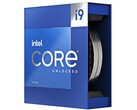We are potentially less than a month away from the official launch of the Intel Raptor Lake CPUs as they are reportedly breaking cover on September 27. But this hasn’t stopped leakers from testing the 13th gen chips early. This time we have a review of the Core i9-13900K by the Chinese reviewer EJ Hardware that focuses on the chip's performance against the 12th gen Core i9-12900K.
The reviewer tested the CPUs with an MSI Z690 GODLIKE, a Phanteks Glacier One 360 MP watercooler, Colorful Gamer RGB DDR5-4800 RAM, and an RTX 3090. It is unclear whether the Raptor Lake chip in question was an Engineering Sample (ES) or a Qualification Sample (QS).
CPU-Z and Cinebench performance
EJ Hardware put the Core i9-13900K and the Core i9-12900K through their paces in CPU-Z and Cinebench R20/R23 alongside a set of games to gauge the gaming performance of the Raptor Lake chip.
In CPU-Z, the Core i9-13900K surprisingly performed a bit slower than the stock Core i9-12900K in the single-core test. The former scored 801.6 points while the latter managed to output 827.4 points. However, the Core i9-13900K gained a 30% lead over the Core i9-12900K in the multi-core benchmark with a score of 14,894 and 11,455 respectively.
After the reviewer overclocked the P-cores on the Core i9-13900K and the Core i9-12900K to 5.2 GHz, the single-core benchmark scores of both chips remained roughly identical. On the other hand, the Raptor Lake CPU gained a 29% lead over the Alder Lake chip.
Moving on to Cinebench R23, the Core i9-12900K produced a score of 2,003 while the Core i9-13900K curiously fell behind with 1,931 points in the single-threaded test. The results of the Cinebench R23’s multi-core benchmark followed a similar pattern to the CPU-Z test, as the Core i9-13900K outclassed the Core i9-12900K by 30% with scores of 35,572 and 27,343 respectively.
Finally, after EJ Hardware put an overclock of 5.2 GHz on the P-cores of both CPUs, the single-threaded delta was effectively eliminated, whereas the multi-threaded lead of the Core i9-13900K shrunk from 30% to 28%.
Gaming performance
Seeing the single-core performance of the Core i9-13900K against the Core i9-12900K, it is quite clear that the Raptor Lake chip wasn’t optimized well enough for single-threaded tasks. This is to be expected from an ES. The seemingly anomalous single-score showing of the Raptor Lake Core i9 also appeared to affect the gaming performance, as the CPU often failed to overtake the Alder Lake processor in the limited set of games that the reviewer tested.
For instance, in Cyberpunk 2077, the Core i9-13900K with its P-cores and E-cores running at 4.9 and 3.7 GHz respectively, produced 157.94 fps. The Core i9-12900K beat the 13th gen processor with 174.32 fps, a lead of roughly 10%. After the reviewer overclocked the P-cores and E-cores of both CPUs to 5.2 and 3.8 GHz respectively, the Core i9-13900K often matched or exceeded the performance of its predecessor.
The strange gaming performance of the Raptor Lake flagship continued with a 5.5 GHz overclock on the P-cores. Surprisingly, even with such a high clock speed, the Core i9-13900K appeared to lose to an overclocked Core i9-12900K in some games.
Power consumption and temperature
EJ Hardware found that the Core i9-13900K consumed much less power and ran demonstrably cooler than the Core i9-12900K at the same clock speeds. For instance, on average, the Raptor Lake Core i9 with its P-cores locked to 4.9 GHz used 177 W and ran at 61°C (141.8°F) in AIDA64. The Alder Lake Core i9, on the other hand, used up to 280 W and got pretty toasty at 86°C (186.8°F) on average.
Although the power consumption delta was reduced to roughly 10 W when the reviewer overlocked both CPUs to 5.2 GHz, the Core i9-13900K still remained 10°C cooler at 76°C (168.8°F).
Finally, the Core i9-13900K running an all-core frequency of 5.2 GHz appeared to consume 378 W and got quite hot at 92°C (197.6°F). Per VideoCardz, 440 W seemed to be the Maximum Turbo Boost limit of the CPU in the test.




















